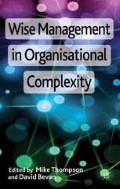Abstract
The spectacular rise of China as a world economic power has prompted management scholars to probe the management aspect of China’s business. One major question asked is whether there is a uniquely Chinese management approach and practice that has emerged in the process (Leung, 2012; Chen and Miller, 2010). This chapter primarily responds to this question by critically examining one traditional Chinese concept that may have relevance to today’s management. The chapter reconstructs a concept of Wang Dao (王道, Kingly Way of Governance, or Kingly Way), originally proposed in the Confucian classics, and articulates its modern meanings in the context of business. The idea of Wang Dao (or Wangdao) was first advocated by Mencius as the supreme moral principle of political governance. The idea of Wang Dao stood as a minority view of governance amid a dominant ethos of governance during the Warring States period (476–221 bce) in China. The dominant way of governance in that period was by force and conquest, which resembles the way a hegemon would rule a country. This way of governance was fittingly named Ba Dao (霸道, the Hegemonly Way) at that time. Wang Dao, in contrast, is governance by benevolence and moral rightness or appropriateness. Its corporate version is articulated as Wang Dao management.
Access this chapter
Tax calculation will be finalised at checkout
Purchases are for personal use only
Preview
Unable to display preview. Download preview PDF.
References
Aristotle (2000). Nicomachean Ethics, trans. W.D. Ross. NetLibrary, Boulder, CO.
Chan, W.T. (1963). Source Book in Chinese Philosophy. Princeton University Press.
Chen, M.-J., and D. Miller (2010). ‘West Meets East: Toward an Ambicultural Approach to Management’. Academy of Management Perspectives, 24(4): 6–16.
Hannah, S.T., B.J. Avolio and D.R. May (2011). ‘Moral Maturation and Moral Conation: A Capacity Approach to Explaining Moral Thought and Action’. Academy of Management Review, 36(4): 663–85.
Ip, P.-K. (2000). ‘Developing Virtuous Corporation with Chinese Characteristics for the Twenty-first Century’. In F.-J. Richter (ed.), The Dragon Millennium: Chinese Business in the Coming World Economy, pp. 183–206. Quorum Books, Westport, CT.
Ip, P.-K. (2009a). ‘The Challenge of Developing a Business Ethics in China’. Journal of Business Ethics, 88(2): 211–24.
Ip, P.-K. (2009b). ‘Is Confucianism Good for Business Ethics in China?’ Journal of Business Ethics, 88(3): 463–76.
Ip, P.-K. (2011). ‘Practical Wisdom of Confucian Ethical Leadership — A Critical Inquiry’. Journal of Management Development, 30(7/8): 685–96.
Jordan, J., and R.J. Sternberg (2007). ‘Wisdom in Organizations: A Balanced Theory Analysis’. In E.H. Kessler and J.R. Bailey (eds), Handbook of Organizational and Managerial Wisdom, pp. 3–19. Sage Publications, Thousand Oaks.
Kessler, E.H., and J.R. Bailey (2007) (eds). Handbook of Organisational and Managerial Wisdom. Sage Publications, Thousand Oaks, CA.
Legge, J. (2012). The Works of Mencius. Electronic Library of Chinese Classics, available at http://ctext.org/mengzi.
Leung, K. (2012). ‘Indigenous Chinese Management Research: Like It or Not, We Need It’. Management and Organization Review, 8(1): 1–5.
Li, J.T., A.S. Tsui and E. Weldon (2000) (ed.), Management and Organizations in the Chinese Context. Macmillan, London.
Lin, H.-C., and S.-T. Hou (2010). ‘Management Lessons from the East: An Interview with Acer’s Stan Shih’. Academy of Management Perspectives, 24(4): 17–24.
McKenna, B. (2012). ‘Keynote Address. International Conference on Wise Management in Organisational Complexity, May 23–24’. China Europe International Business School, Shanghai.
Meeks, T.W. (2009). ‘Neurobiology of Wisdom — A Literature Review’. Archives of General Psychiatry, 66(4): 355–65.
Nonaka, I., and H. Takeuchi (2011). ‘The Wise Leader — How CEOs Can Learn Practical Wisdom to Help Them Do What’s Right for Their Companies — and Society’. Harvard Business Review, May: 59–67.
Rooney, D., B. McKenna and P. Liesch (2010). Wisdom and Management in the Knowledge Economy. Routledge, New York.
Shih, S. (2011). ‘The Spirit of Wangdao, a speech in Chinese delivered on 23 August’. Available online at http://bschool.hexun.com/2011-08-23/132721452.html (accessed May 2012).
Shih, S., and W. Lin (1996). Reengineering Acer. Commonwealth Publishing, Taipei (in Chinese).
Sternberg, R.J. (2003) Wisdom, Intelligence, and Creativity Synthesized. Cambridge University Press, New York.
Sternberg, R.J. (2004). ‘What Is Wisdom and How Can We Develop It?’ Annal of The American Academy of Political and Social Science, 591(1): 164–74.
Sternberg, R.J., and J. Jordan (2005). A Handbook of Wisdom. Cambridge University Press, New York.
Trowbridge, H.T. (2011). ‘Waiting for Sophia: 30 Years of Conceptualizing Wisdom in Empirical Psychology’. Research in Human Development, 8(2): 149–64.
Editor information
Editors and Affiliations
Copyright information
© 2013 Po-Keung Ip
About this chapter
Cite this chapter
Ip, PK. (2013). Wang Dao Management as Wise Management. In: Thompson, M.J., Bevan, D. (eds) Wise Management in Organisational Complexity. Palgrave Macmillan, London. https://doi.org/10.1057/9781137002655_8
Download citation
DOI: https://doi.org/10.1057/9781137002655_8
Publisher Name: Palgrave Macmillan, London
Print ISBN: 978-1-349-43389-6
Online ISBN: 978-1-137-00265-5
eBook Packages: Palgrave Business & Management CollectionBusiness and Management (R0)

